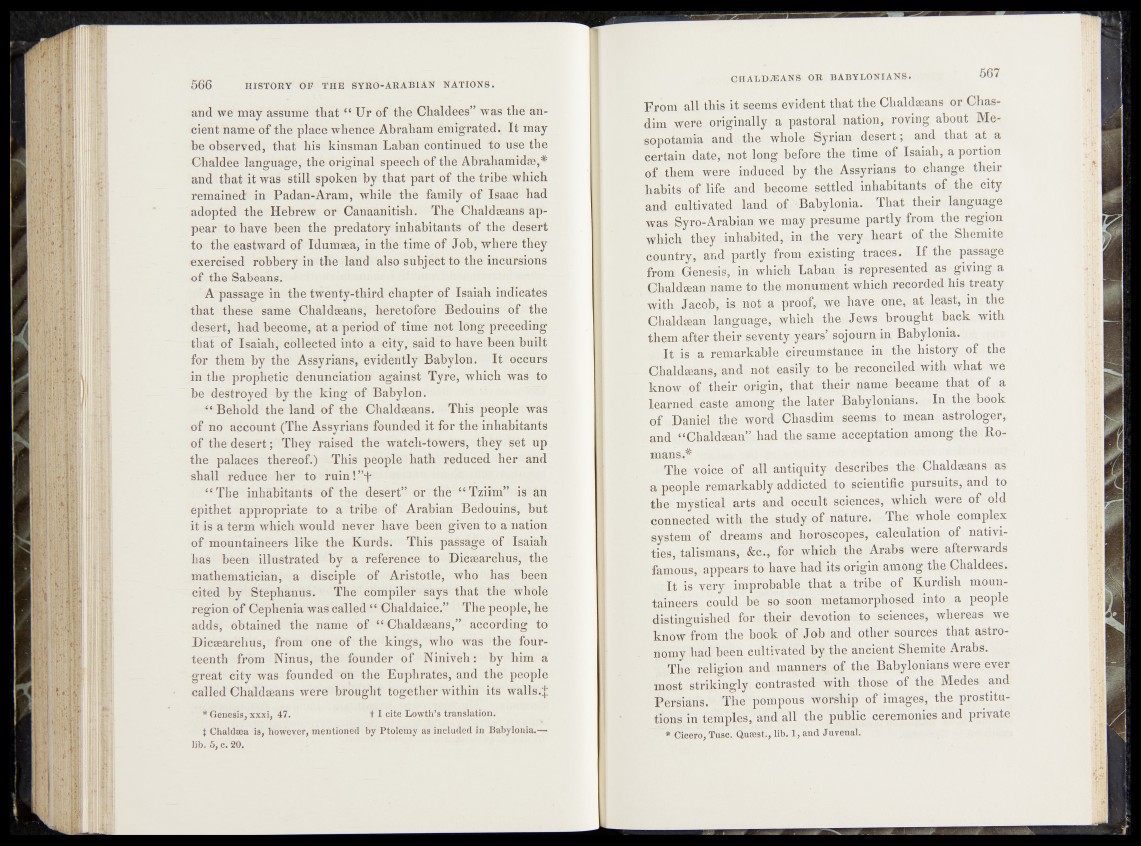
tand we may assume that “ U r of the Chaldees” was the ancient
name of the place whence Abraham emigrated.. It may
be observed, that his kinsman Laban continu e‘d to uko the
-Chaldee language, the original speech of the Abrahamidse,*
and that it was still spoken-'fey that part of thedribe which
remained in Padan-Aram, while the family of Isaac had
adopted the Hebrew or Canaanitish. The Chaldaeans appear
to have been the predatory inhabitant of the desert
to the eastward of Idumaea, in the time of Job, where they
exercised robbery in the land also subject to the-incursions
«of the Sabeans.
A passage in the twenty-third chapter of Isaiah indicates
that these same Chaldaeans, heretofore Bedouin'S"' óf' thO
desert; had become, at a period of time not long preceding
that of Isaiah, collected into a city, said to have been h ip t
for them by the Assyrians, evidently Babylon. Ife-’Ooèürs
in the prophetic denunciation against Tyre; which was *to
be destroyed by the king of Babylon.
“ Behold the land of the Chaldmans. This people was
of no account (The Assyrians founded it for thedhhabitants
of the desert; They raised the watch-towers, they set up
the palaces thereof.) -This people hath reduced her and
shall reduce her to ruin!”f*
“ The inhabitants of the desert” ttr the- “ Tzifra” -is an
epithet appropriate to a tribe' of Arabian Bedouins, but
it is a term which would never have peöii given'to* agnation
of mountaineers like the Kurds. This passage of Isaiah
has been illustrated by a reference to Dicaearchus, the
mathematician, a disciple of Aristotle, who has been
cited by Stephanus. The compiler says that the whole
region of Cephenia was called “ Chaldaice.” ? The people, he
adds, obtained the name of “ ChaMsean#;^-according to
JDicsearchus, from one of the kings, who was the fourteenth
from ; INiiifiSj the founder of Niniveh: by him a
great city was founded ofi the Euphrates, and the people
called Chaldseans were brought together within its walls.J
' * Genesis, xxxi, 47. 11 cite Lowth’s translation.
t Chaldaea is, however, mentioned by Ptolemy as included in Babylonia.—
lib. 6, e. 20.
From all this it, seems evident; that the Chaldseans or Chas-
diip ,w>e^originally a pastoral nation,, roving, about Me-
^ppe^amia and the wholef.,..»Syrian desert; and that at a
certain id^|f®0'%long before the time of Isaiah, a portion
of is them w-ere indp^dyby the* Assyrians to change their
habitS(;,of life and-, become settled inhabitants o fth e city
and cultivated; land .bf^Babylonia. That their language
was Syro-Arabian we may presume partly from the region
which' they inhabited, i4$hythe -very;i heart <of the Shemite
country, andpartly from,fexistir^g .trapes. If the passage
from Genesis,: in ., which Laban is represented, as giving a
Chaldsegn nam»e |© the/monurn^ which recorded his treaty
witWdac^y.is/ihof.n proof,- we. have- one, at; least, in the
language;, which the', Je$»-rbrought back with
them after their seventy years.’ sojourn in Babylonia. -
Iti,ls a remarkable ,!circumstance' in-..the, history of the
-Qhaldaeams, and not easily to be reconciled-with what we
know, of, their origin^ that their name, became, that of a
learned.caste among’ the late* Babylonians. In the hook
of Daniel the word Chasdim seems;, to .mean, astrologer,
and “Chaldsean” had the .same acceptation among the Ror
Naans# • - !* » 4%«
The voice of all antiquity describes thedChaldaeans as
a people remarkably addicted to^scientific pursuits, and to
the mystical arts and occult Sciences, which were of old
connected with the study o f,-nature. The whole complex
systean of dreams and horoscopes, calculation of nativities,
talismans, &c., for which the Arabs were afterwards
famous,: appears to have had its origin.among the Chaldees».
It is very improbable that a tribe..p.f Kurdish ; jnoun-
taxneeijS' could be so soon metamorphosed into a people
distinguished for their devotion do . sciences,, whereas we
know from the book of Job and other.-sources that astronomy
had been cultivated by the ancient .Shemite Arabs.
t ,The- religion and manners of the Babylonians were ever
most strikingly contrasted* w.ith , those of the Medes and
Persians. The pompous worship of images, the prostitutions
in temples, and all the public ceremonies and private
~ "* Cicero, Tusc. Qusest., lib. 1, and Juvenal.